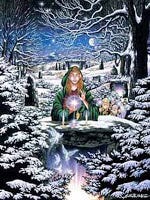Wiccans: A Case Study in Faith and Historicity?

You might have seen the recent Gap commercial that throws just about every religious winter holiday into the mix.
If you haven't seen it, here it is:
In addition to Christmas, Hanukkah and Kwanzaa you might have heard a "Go Solstice!" in there as well. That's a nod to Wicca and their celebration of the winter solstice which usually occurs on December 21 or 22 (it's the 21st this year).
One of the claims Wiccans make to demonstrate their priority over the Christian's Christmas is the fact that Christmas isn't really Christ's birthday. Rather, the early church linked its celebration of Christmas with the pre-existing pagan (Roman) solstice celebrations. Consequently, Wiccans claim that "Christmas" is really their holiday. Christians stole it.
Mark Oppenheimer has an interesting article up over at Slate about how Wiccans, who have a point about Christmas, have struggled to legitimize some of their other claims of "deep history." From Oppenheimer's article:
The rare Wiccan belief that pans out is that Christmas is an adaptation of a solstice celebration. We have no way of knowing when Jesus was born. Scholars generally agree that by the late fourth century his birthday was figured for Dec. 25, because that was already the day of the Roman feast of Sol Invictus (the "undefeatable sun"), a solstice holiday, as well as the time of Saturnalia, the festival for Saturn.
But in reaching for a usable past, Wiccans trumpet numerous other historical claims that are entirely without merit. The central claim that Wicca is descended from pre-Christian cultures and that it was driven underground by violent Christians was popularized by the writer Starhawk, whose 1979 book The Spiral Dance: A Rebirth of the Ancient Religion of the Great Goddess is a foundational text for contemporary Wiccans. Starhawk based her teachings on the work of, among others, Marija Gimbutas, a UCLA anthropologist who in the 1970s and 1980s argued that in pre-Christian times there existed a unified, female-centered, Indo-European society that worshipped a Goddess.
Recent scholars, however, have shown that there was no prehistoric Goddess-centered matriarchy. They've also concluded that the Celts probably did not celebrate eight seasonal sabbats, and, alas, that contemporary Wicca was invented in the 1950s by Gerald Gardner, an English civil servant with a deep interest in the 19th-century occult.
The part of Oppenheimer's article that really intrigued me was his analysis of faith and historicity. Specifically, by making claims that can be fact-checked the Wiccan faith opens itself up to a historical debunking that undermines the faith experience of believers. Here's Oppenheimer's analysis:
And therein lies the problem for Wiccans: Religions tend to succeed to the extent that they are not subject to tests of proof. They are based on beliefs in invisible deities and on mystical experiences that can't be explained by one person to another but must be experienced for oneself. So, the more obscured by time or erosion a religion's possible proofs are, the more freely the religion can succeed as a matter of faith. Mormonism could never flourish so long as Joseph Smith could be interrogated, face to face, about his visions. He needed to become a mythic—that is to say, long dead—figure. Jews should pray that we never find the Ark of the Covenant; the truth of a religious system should not be subjected to carbon-dating the tablets.
So long as Wiccans are hung up on whether Christmas is derived from old solstice rites (it is) or whether Christendom murdered 9 million alleged witches from the 14th to the 18th centuries (not even close), the religion will seem a little absurd. It's one thing to have faith in things unseen; that's human. It's a whole other thing to have faith in an easily disproved historical conceit.
For skeptics of religion (think Sam Harris or Richard Dawkins) there would be little difference between the historical claims of Christians versus the historical claims of Wiccans. That is, just because the historical claims of Christianity can't be verified shouldn't make them any more true or any less outlandish when compared to Wiccans.
The relationship between historicity and faith is a snarly one. And theologians are all over the place on this issue. Consider a recent discussion on Ben Myer's blog about Richard Swinburne's application of Bayesian probability to the resurrection. I'm no theologian, but it seems like a great deal of the debate on Ben's blog boils down to how one should (or if they should) approach the resurrection as a historical and empirical event. One move is to remove the resurrection from the coils of historicity. This extracts the resurrection from conversations about "proof" or "disproof." The other move is to apply the tools of empirical and historical evidence to the resurrection to either "prove" or render "probable" the historical claim of the resurrection.



